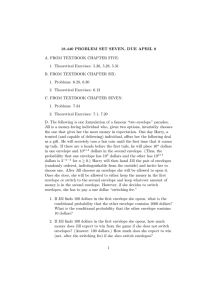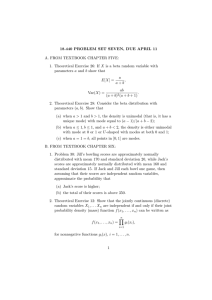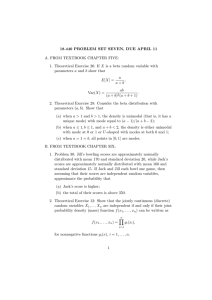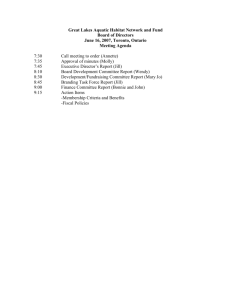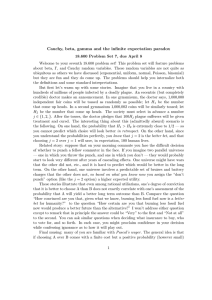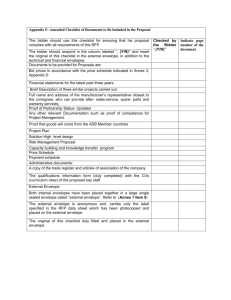18.440 PROBLEM SET THREE, DUE OCTOBER 2
advertisement
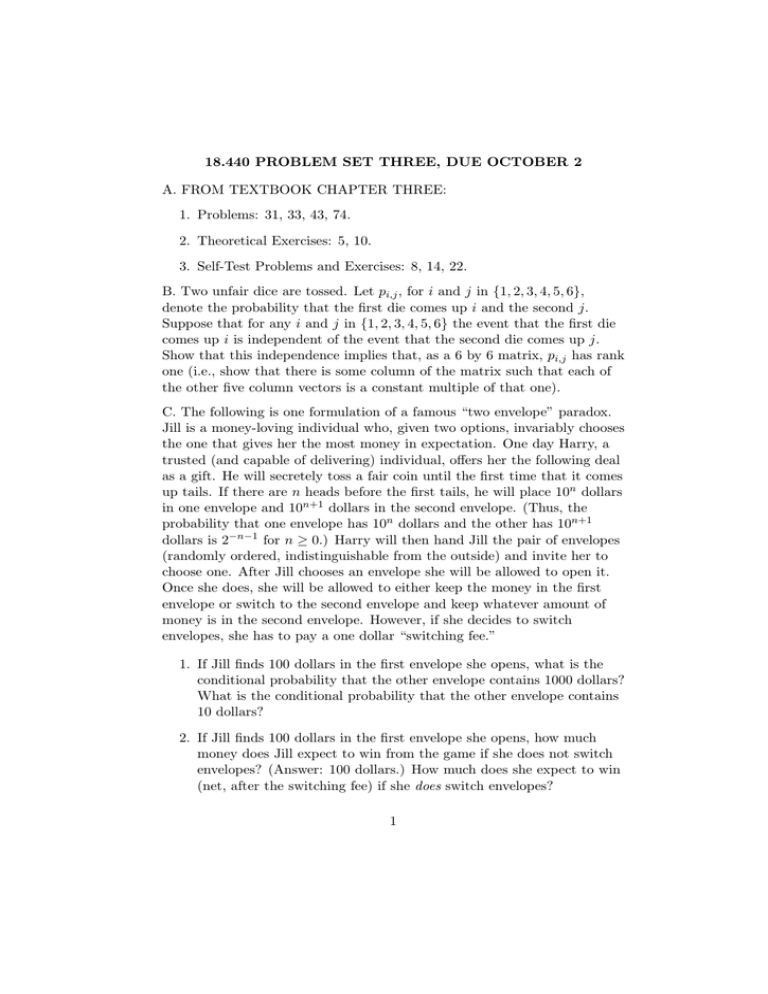
18.440 PROBLEM SET THREE, DUE OCTOBER 2
A. FROM TEXTBOOK CHAPTER THREE:
1. Problems: 31, 33, 43, 74.
2. Theoretical Exercises: 5, 10.
3. Self-Test Problems and Exercises: 8, 14, 22.
B. Two unfair dice are tossed. Let pi,j , for i and j in {1, 2, 3, 4, 5, 6},
denote the probability that the first die comes up i and the second j.
Suppose that for any i and j in {1, 2, 3, 4, 5, 6} the event that the first die
comes up i is independent of the event that the second die comes up j.
Show that this independence implies that, as a 6 by 6 matrix, pi,j has rank
one (i.e., show that there is some column of the matrix such that each of
the other five column vectors is a constant multiple of that one).
C. The following is one formulation of a famous “two envelope” paradox.
Jill is a money-loving individual who, given two options, invariably chooses
the one that gives her the most money in expectation. One day Harry, a
trusted (and capable of delivering) individual, offers her the following deal
as a gift. He will secretely toss a fair coin until the first time that it comes
up tails. If there are n heads before the first tails, he will place 10n dollars
in one envelope and 10n+1 dollars in the second envelope. (Thus, the
probability that one envelope has 10n dollars and the other has 10n+1
dollars is 2−n−1 for n ≥ 0.) Harry will then hand Jill the pair of envelopes
(randomly ordered, indistinguishable from the outside) and invite her to
choose one. After Jill chooses an envelope she will be allowed to open it.
Once she does, she will be allowed to either keep the money in the first
envelope or switch to the second envelope and keep whatever amount of
money is in the second envelope. However, if she decides to switch
envelopes, she has to pay a one dollar “switching fee.”
1. If Jill finds 100 dollars in the first envelope she opens, what is the
conditional probability that the other envelope contains 1000 dollars?
What is the conditional probability that the other envelope contains
10 dollars?
2. If Jill finds 100 dollars in the first envelope she opens, how much
money does Jill expect to win from the game if she does not switch
envelopes? (Answer: 100 dollars.) How much does she expect to win
(net, after the switching fee) if she does switch envelopes?
1
3. Generalize the answers above to the case that the first envelope
contains 10n dollars (for n ≥ 0) instead of 100.
4. (*) Jill concludes from the above that, no matter what she finds in
the first envelope, she will expect to earn more money if she switches
envelopes and pays the one dollar switching fee. This strikes Jill as a
bit odd. If she knows she will always switch envelopes, why doesn’t
she just take the second envelope first and avoid the envelope
switching fee? How can she be maximizing her expected wealth if she
spends an unnecessary “switching fee” dollar no matter what? How
does one resolve this apparent paradox?
5. (*) Enterprising Ernie views every mathematical puzzle as a
money-making opportunity. (For example, he has been known to
charge people 51 cents to play a card game that pays 50 cents in
expectation regardless of strategy.) Ernie knows that both Jill and
Beth are capable of paying arbitrarily large sums, but that both Jill
and Beth, given a choice between two options, will always maximize
their own expected payoffs. He invites Jill and her like-minded friend
Beth to play the following game with him. Ernie chooses numbers
10n and 10n+1 from the probability distribution above, writes them
on two slips of paper, and puts one slip in each of two envelopes. He
then gives one envelope to Jill and one to Beth. Let B be the
amount in Beth’s envelope and J the amount in Jill’s envelope. Jill
and Beth observe only the numbers in their own envelopes. Ernie
tells Beth that if she gives him B + 1 dollars, he will give her J
dollars. He tells Jill that if she gives him J + 1 dollars he will give
her B dollars. Ernie is confident that both Jill and Beth will reason
that (conditioned on what they have seen on their own envelopes)
the transaction will make them money in expectation. Thus, Ernie
will receive B + 1 + J + 1 dollars while paying out only B + J — a
sure two dollar profit for Ernie. Is this game a good deal for all three
players? Explain.
2
